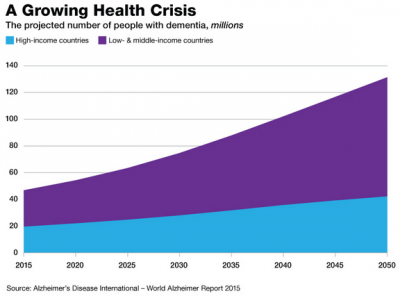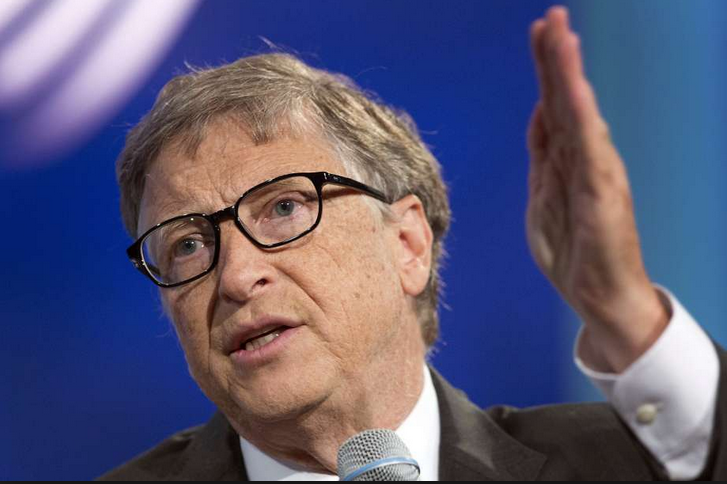aNewDomain — Calling to mind male family members who’ve suffered with the disease, Microsoft founder Bill Gates is funneling $50 million in personal monies to advance research into the diagnosis and prevention of Alzheimer’s
“I’m making this investment on my own, not through the (Bill and Melinda Gates) foundation,” he wrote in a post on his personal blog, GatesNotes. The investment vehicle is his new Dementia Discovery Fund (DDF), which aims to speed progress in identifying the causes and potential cures for the disease.
For Gates, this battle is personal. Several male Gates family members have suffered the disease, he wrote, describing a horrifying state of affairs that slowly drains its victims of life as horrified, helpless family members watc.
“I know how awful it is to watch people you love struggle as the disease robs them of their mental capacity, and there is nothing you can do about it. It feels a lot like you’re experiencing a gradual death of the person that you knew,” Gates writes.
“My family history isn’t the sole reason behind my interest in Alzheimer’s. But my personal experience has exposed me to how hopeless it feels when you or a loved one gets the disease,” wrote Gates
Gates’ post today, titled simply “Why I’m Digging Deep Into Alzheimer’s,” discussed at length where Gates thought researchers should redirect their efforts. For example, he hopes that his investment will let researchers look for clues beyond pathways relating to amyloid buildup, where much of the work is focused.
The DDF monies will still support that work, he said, “but it also will flow toward new and diverse approaches that aren’t so mainstream.”
There’s also a global focus that will sound familiar to anyone who knows Gates’ foundation work. Even with increased resources, he explained, it could be a decade or even longer before the first Alzheimer’s treatments arrive. And they’ll be expensive at first.
“Once that day comes, our foundation might look at how we can expand access to the world’s poor countries,” Gates said.
Not enough progress
In recent years, slow and steady progress has managed to corner such a guaranteed killer as HIV into a chronic illness that medicine can hold in check, says Gates. With the right focus and enough resources, we might be able to do the same with Alzheimer’s, he said in the post.
Another issue: Testing. Sure, there are cognitive tests to determine whether someone is suffering from dementia and memory loss, but these are subjective measures that, obviously, vary widely from patient to patient.
What if you live a long time, but your added years aren’t healthy ones? he asked.
Here’s the video Gates posted in his blog about the new project.
A person with Alzheimer’s or another form of dementia spends five times more every year out-of-pocket on healthcare than a senior without a neuro-degenerative condition.
“Unlike those with many chronic diseases, people with Alzheimer’s incur long-term care costs as well as direct medical expenses. If you get the disease in your 60s or 70s, you might require expensive care for decades,” Gates writes.
Though he was driven on at first by personal experience with Alzheimer’s, Gates said the astronomically high costs of the disease to humans, families, societies and whole governments is what kept his interest.
According to his numbers, Americans alone will spend $260 billion caring for Alzheimer’s and other older Americans who suffer dementia — in 2017 alone.
With no watershed research or cure yet visible on the horizon, Alzheimer’s will mercilesslly pound healthcare budgets around the world in the coming years and decades.
 And dementia cases aren’t flat over time. Take a look at the World Alzheimers Report chart at right. The numbers of victims are marching ever upward.
And dementia cases aren’t flat over time. Take a look at the World Alzheimers Report chart at right. The numbers of victims are marching ever upward.
The human cost, he emphasized, is “difficult to put into numbers. It’s a terrible disease that devastates both those who have it and their loved ones.”
Over the last year, Gates said he dove deeply into how the Alzheimer’s battle is shaping up so far. The news wasn’t all bad, he said: “There’s a lot of amazing work being done in this field to delay Alzheimer’s and reduce its cognitive impact. What I’ve heard from researchers, academics, funders, and industry experts makes me hopeful that we can substantially alter the course of Alzheimer’s.
To get there, Gates recommends a focus on finding exactly causes Alzheimer’s or how to stop its progress, adds Gates. That’s item one on the Alzheimer’s research to do list he lays out next. “We need to better understand how Alzheimer’s unfolds,” he writes, adding that “the brain is a complicated organ. Because it’s so difficult to study while patients are alive, we know very little about how it ages normally and how Alzheimer’s disrupts that process.”
Because most of what we understand about the brain and the diseases that attack it comes from autopsies, researchers are more than familar with houw Alzheimer’s looks in the final stages.
Scientists also have yet to explain why African Americans and Latinos are more likely to suffer Alzheimer’s than are European-Americans. Such genomic research is going to be key to learning more about how Alzheimer’s starts and what happens when it does. A simple blood test is what’s needed, he says, though of course scientists won’t and can’t get there without knowing what to look for and all the genetic mutations a lab could be expected to catch.
Also, research needs to be aimed at finding multiple approaches to prevent or slow down down Alzheimer’s. The majority of drug trials going on right now are targeting brain buildups of two proteins, myloid and tau, that interwine and build up into a plaque in the brain. “I hope those approaches succeed, but we need to back scientists with different, less mainstream ideas in case they don’t. A more diverse drug pipeline increases our odds of discovering a breakthrough.”
In the meantime, the US needs to make it easier to pre-qualify and enroll people in clinical trials.It shouldn’t take many months or even years, as it often does now, he says. If we could develop a process to pre-qualify participants and create efficient registries, we could start new trials more quickly.
Lastly, Gates would like to focus on improving data collection, tracking and usage around Alzheimer’s genetics, symptomalogy and more. The idea is to make it easier for humans and the AI-equipped drug discovery tools we increasingly use to note the patterns where medicines might logically intervene.
Thanks to scientific advances that target cancer, infections and heart disease, “it’s no longer unusual for a person to live well into their 80s and beyond.” He continued:
“My dad will celebrate his 92nd birthday in a couple weeks, a milestone that was practically unimaginable when he was born,” writes Gates.
Breakthrough? It’s me, Bill
Alzheimer’s research is in bad need of some more breakthroughs in research right now, Gates added.
“With all of the new tools and theories in development, I believe we are at a turning point in Alzheimer’s R&D. Now is the right time to accelerate that progress before the major costs hit countries that can’t afford high priced therapies and where exposure to the kind of budget implications of an Alzheimer’s epidemic could bankrupt health systems.”
It isn’t enough that people are living longer. They need to be healthy just as long, Gates said.
The battle to cure Alzheimer’s is “a frontier where we can dramatically improve human life. It’s a miracle that people are living so much longer, but longer life expectancies alone are not enough.”
To follow Gates efforts and updates on his DDF fund to cure Alzheimer’s, head
For aNewDomain, , I’m Gina Smith.
Cover image: Alzheimer's Disease: 2017 Facts and Figures by Gina Smith on Scribd

